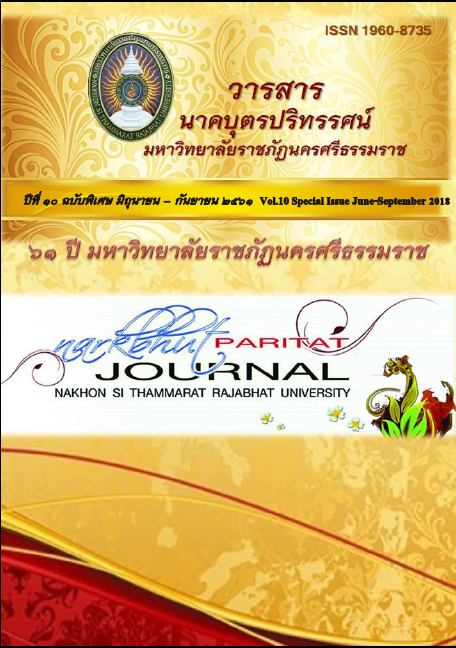ผลการใช้กิจกรรมการเรียนร่วมกันกับเพื่อนสนิทและคนรู้จักโดยใช้กูเกิลด็อกเพื่อส่งเสริม การคิดอย่างมีวิจารณญาณของนักศึกษามหาวิทยาลัยราชภัฎสุรินทร์ The Effects of Collaborative Learning Activities with Close Friends and Acquaintances using Google Doc to Promote Critical Thinking of Surindra Rajabhat University Students
Main Article Content
Abstract
This research aims to 1) study the effects of Collaborative learning activities with close friends and acquaintances using Google Docs to promote critical thinking; 2) compare the results of Collaborative learning activities between scores before and after practice, and between three different types of groupings. The sample consisted of 114 students from Surindra Rajabhat University. Research tools include The Collaborative learning activities using Google Docs and The Critical Thinking Measurement. Analyze the data using mean, standard deviation, T-score, t-test, and F-test.
The results showed that
- Before class, the scores of Critical Thinking of Students in Surindra Rajabhat University at the very high level, 0%, high level at 36.84%, the moderate level at 30.70% and low to the very low at 24.56% and 7.90%, respectively. After class, the score of Critical Thinking of Students in Surindra Rajabhat University at the very high level was 3.51%, high level of 38.60%, moderate level of 30.70%, low to the very low level of 20.17% and 7.02%, respectively.
- The scores of critical thinking after class were higher than those before the study at the .05 level of significance.
- The scores of critical thinking classified by grouping style of learners were not different.
Article Details
Section
บทความวิจัย
References
Bulu, S. T., & Yildirim, Z. (2008). Communication Behaviors and Trust in Collaborative Online Teams. Educational Technology & Society. 11 (1): 132-147.
Goodsell, A.N., Maher, R.M, Tinto. (1996). Collaborative learning: A source book for higher education. The National Center on Postsecondary Teaching, and Assessment (NCTLA).
Hanham, J., & McCormick, J. (2009). Group work in schools with close friends and acquaintances: Linking self-processes with group processes. Learning & Instruction, 19(3), 214–227. doi:10.1016/j.learninstruc.2008.04.002
Isaranggoon, W. (2012). Social Studies Teacher and Student Development. Bangkok: Chulalongkorn University. (in Thai).
Johnson, D.W. and Johnson, R.T.An. (1994). Overview of Cooperative Learning. Creativity and Collaborative learning. Baltimore Maryland: Paul H. Brookes Publishing.
Johnson, K., McHugo, C., and Hall, T. (2006). Analyzing the efficacy of blended learning using Technology Enhanced Learning (TEL) and m-Learning delivery technologies. Retrieved September 15, 2017 from https://www.ascilite.org/conferences/sydney06
/proceeding/pdf_papers/p73.pdf
Jones, S. and Creese, L. (2001). E-education: Creating partnerships for learning. Retrieved September 15, 2017 from https://ultibase.rmit.edu.au/Articles/aug01/jones1.htm
Mezirow, J. (1981). A critical theory of adult learning and education. Adult Education Quarterly, 32 (Fall), 3-24.
Oliver, R. (2001). Exploring the development of critical thinking skills through a web-supported, problem-based learning environment. In J. Stephenson (Ed.), Teaching and learning online: pedagogies for new technologies, London: Kogan Page, 98-111.
Sills, Digby, A., & Russ, P. (1991). Cooperative learning: A guide to research. New York: Garland.
Suwan, C. (2009). Development of Critical Thinking Training Program Sufficiency Economy For the student teacher Upper Northern Rajabhat University. A thesis of the Requirement for the Doctoral Degree, Chiang Rai Rajabhat University. (in Thai).
Tabtimtong, A. (2009). The Development of the Web Lessons to Promote Critical Thinking about Computer Technology for Students in Mathayomsuksa 4-6. A thesis of the Requirement for the Master Degree of Faculty of Education, Dhonburi Rajabhat University. (in Thai).
Watson, G. and E. M. Glaser. (1964). Critical thinking appraisal manual. New York: Harcourt, Brace, and World.
_________. (1980). Watson-Glaser critical thinking appraisal. Texas: The Psychological Corporation.
Wenyi Zhou, Simpson, E., & Domizi, D. P. (2012). Google Docs in an Out-of-Class Collaborative Writing Activity. International Journal of Teaching & Learning in Higher Education, 24(3), 359–375.
Goodsell, A.N., Maher, R.M, Tinto. (1996). Collaborative learning: A source book for higher education. The National Center on Postsecondary Teaching, and Assessment (NCTLA).
Hanham, J., & McCormick, J. (2009). Group work in schools with close friends and acquaintances: Linking self-processes with group processes. Learning & Instruction, 19(3), 214–227. doi:10.1016/j.learninstruc.2008.04.002
Isaranggoon, W. (2012). Social Studies Teacher and Student Development. Bangkok: Chulalongkorn University. (in Thai).
Johnson, D.W. and Johnson, R.T.An. (1994). Overview of Cooperative Learning. Creativity and Collaborative learning. Baltimore Maryland: Paul H. Brookes Publishing.
Johnson, K., McHugo, C., and Hall, T. (2006). Analyzing the efficacy of blended learning using Technology Enhanced Learning (TEL) and m-Learning delivery technologies. Retrieved September 15, 2017 from https://www.ascilite.org/conferences/sydney06
/proceeding/pdf_papers/p73.pdf
Jones, S. and Creese, L. (2001). E-education: Creating partnerships for learning. Retrieved September 15, 2017 from https://ultibase.rmit.edu.au/Articles/aug01/jones1.htm
Mezirow, J. (1981). A critical theory of adult learning and education. Adult Education Quarterly, 32 (Fall), 3-24.
Oliver, R. (2001). Exploring the development of critical thinking skills through a web-supported, problem-based learning environment. In J. Stephenson (Ed.), Teaching and learning online: pedagogies for new technologies, London: Kogan Page, 98-111.
Sills, Digby, A., & Russ, P. (1991). Cooperative learning: A guide to research. New York: Garland.
Suwan, C. (2009). Development of Critical Thinking Training Program Sufficiency Economy For the student teacher Upper Northern Rajabhat University. A thesis of the Requirement for the Doctoral Degree, Chiang Rai Rajabhat University. (in Thai).
Tabtimtong, A. (2009). The Development of the Web Lessons to Promote Critical Thinking about Computer Technology for Students in Mathayomsuksa 4-6. A thesis of the Requirement for the Master Degree of Faculty of Education, Dhonburi Rajabhat University. (in Thai).
Watson, G. and E. M. Glaser. (1964). Critical thinking appraisal manual. New York: Harcourt, Brace, and World.
_________. (1980). Watson-Glaser critical thinking appraisal. Texas: The Psychological Corporation.
Wenyi Zhou, Simpson, E., & Domizi, D. P. (2012). Google Docs in an Out-of-Class Collaborative Writing Activity. International Journal of Teaching & Learning in Higher Education, 24(3), 359–375.

